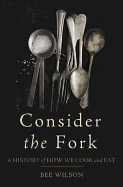
Food writer and historian Bee Wilson delves into the lineage of the cookware, utensils and appliances we use to prepare our meals in Consider the Fork, a surprisingly entertaining history of kitchen technology.
Here technology simply refers to any tool invented for a purpose. Wilson says, "It took countless inventions, small and large, to get to the well-equipped kitchens we have now." She considers how cultural influences have changed the way people prepare and eat their meals throughout history, as well as how cooking implements have left their mark on civilizations. Some ancient cultures, such as the Funnelbeaker culture of Neolithic Europe, are even named for the distinctive types and shapes of their pottery. Wilson primarily addresses the birth and growth of Western cooking, but also covers countries and tribes the world over, including the Maori of New Zealand, who traditionally cooked their food over the naturally occurring boiling pools of the Whakarewarewa hot springs.
Wilson's sprightly, knowledgeable voice skips nimbly through the narratives of pots and pans, knives, grinding implements and eating utensils, working up to the theme of the kitchen as a whole. Short asides on particularly interesting niche items such as the mezzaluna, rice cooker and toaster provide quick, fascinating epilogues to each chapter. Her insights will change the way you look at your kitchen accoutrements. Take the blunt butter knife, descendent of the deadly and versatile medieval belt knife: "It takes a civilization in an advanced state of politesse--or passive aggression--to devise on purpose a knife that does a worse job of cutting." --Jaclyn Fulwood, blogger, Infinite Reads

